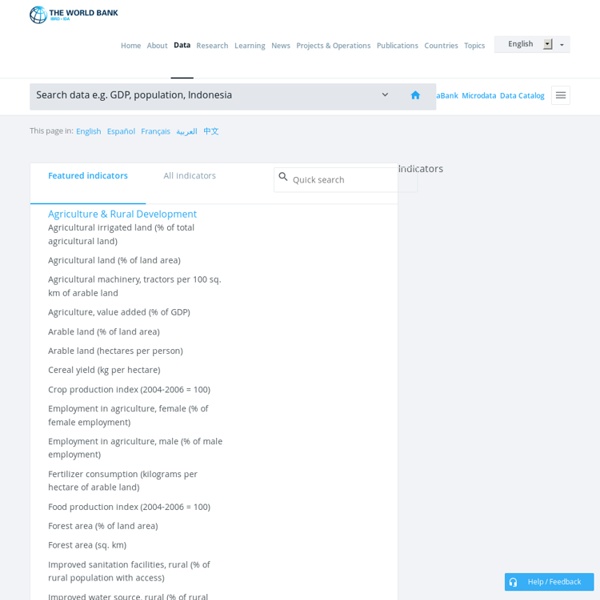Africa Development Indicators
Africa Development Indicators was a primary World Bank collection of development indicators on Africa, compiled from officially-recognized international sources. No further updates of this database are currently planned. See World Development Indicators for more recent data on Africa. TypeTime seriesPeriodicityAnnualLast Updated22-Feb-2013Economy CoverageMNA, IBRD, SSA, IDA, LMY, HICGranularityNational, RegionalNumber of Economies53TopicTrade, Urban DevelopmentUpdate FrequencyNo further updates plannedContact Detailsdata@worldbank.orgAccess OptionsAPI, Bulk download, Mobile app, Query toolAttribution/citationAfrica Development Indicators, The World BankCoverage1960 - 2012
International Programs Data
International Data Base (IDB) Find demographic indicators, population pyramids, and source information for countries and areas of the world with a population of 5,000 or more. World Population Summary Find the latest information on the World Population trends.
La Web que queremos
Firefox y la privacidad Firefox y oportunidades Firefox y la accesibilidad Firefox y la libertad Firefox y el aprendizaje Firefox y el control del usuario
Millennium Indicators
The Millennium Development Goals Report 2013 was launched in Geneva by the Secretary-General on 1 July 2013. The report presents the yearly assessment of global and regional progress towards the MDGs. With the deadline for the MDGs on the horizon, this year's report examines where the targets have been met and where redoubled efforts are needed urgently to accelerate the progress. It also reveals that our attention needs to focus on disparities across geographical areas and population groups within countries.
Arab Justice integrity law governmental corruption Accountability Judiciary Civil Society Constitutional reform
Template for Cyber-Legislation in Bahrain and Syria This report complements the first Study: “Templates of Cyber legislations in the ESCWA countries”, and comprises an electronic study, which presents a review of the status of the Cyber legislations on the regional and international levels. The study gives examples about the legislative basics and points out the interests and expected challenges to set out more extensive cyber legislations. The study focuses on the following topics: (A) Data protection and privacy rights; (B) Protection of privacy and communications in the field of telecommunications; (C) Freedom of speech and censure on the Internet; (D) Intellectual Property; (E) E-Commerce and E-transactions and related fields; (F) Consumer Protection; (G) Cyber Crimes.
Encuesta de proveedores de Internet - Análisis
Hace unos meses comencé una encuesta entre los lectores de este blog y twitter sobre los proveedores de internet y telefonía celular que tienen. El resultado fue variado y muy interesante para analizar, la muestra no es perfecta, no abarca todo lo que querría pero para nacer a partir de un simple blog unos 897 encuestados son una muestra más que suficiente. La realidad de los proveedores en Argentina es muy variada pero sigue un patrón más o menos medible.
UN Millennium Development Goals
Disclaimer The United Nations is not responsible for the content of any messages posted on this site or sites linked from this page. The inclusion of a message does not imply the endorsement of the message by the United Nations. MDG Indicators
World Health Organization Global Health Observatory
Global Strategy for Women's, Children's and Adolescents' Health (2016-2030): Data portal The Every Woman Every Child Global Strategy indicator and monitoring framework includes 60 indicators from health and other sectors. 34 indicators are from the Sustainable Development Goals (SDGs) and 26 from related global monitoring initiatives. From these, 16 key indicators are highlighted to provide a snapshot of progress. The Global Strategy portal provides open access to the latest available data and estimates for the 60 indicators across 194 countries. This involves collaboration across WHO departments, H6 agencies (UNAIDS, UNFPA, UNICEF, UN Women, WHO and the World Bank), other UN organizations - including the UN Statistics Division and UNESCO, and global monitoring partnerships, including the Countdown to 2030 and academic institutions.
Our Data
Download our Data Methodology PDF > Bigger, more diverse, more actionable online data Since we started Compete, we have been continuously updating the quality and consistency of our data. With clickstream data available since 2002, and 10 terabytes of new data arriving monthly, we have amassed and organized hundreds of terabytes of daily consumer digital behavior from a dynamic panel of 2 million consumers. But for an industry overloaded with data, how do we make sure our clients’ research investments generate a measurable impact on marketing ROI?



